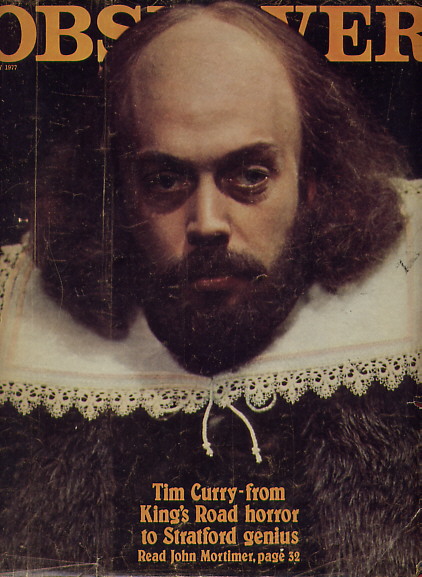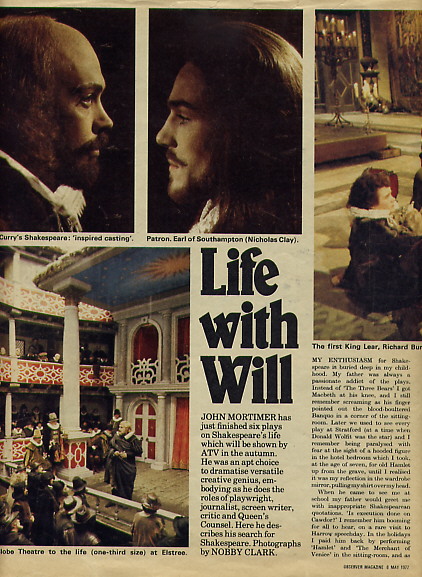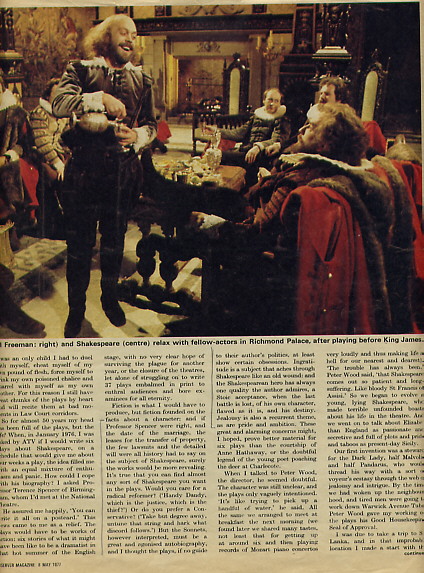Life with Will

|

|

|
three facsimile
pages of the
Observer Magazine 8 May 1977 |
JOHN MORTIMER has just finished six plays on Shakespeare's life
which will be shown by ATV in the autumn. He was an apt choice to dramatise
versatile creative genius, embodying as he does the roles of playwright,
journalist, screen writer, critic and Queen's Counsel. Here he describes
his search for Shakespeare.
My enthusiasm for
Shakespeare is buried deep in my childhood. My father was always a passionate
addict of the plays. Instead of 'The Three Bears' I got Macbeth at his knee,
and I still remember screaming as his finger pointed out the blood‑boultered
Banquo in a corner of the sitting‑room. Later we used to see every play at
Stratford (at a time when Donald Wolfit was the star) and I remember being
paralysed with fear at the sight of a hooded figure in the hotel bedroom
which I took, at the age of seven, for old Hamlet up from the grave, until
I realised it was my reflection in the wardrobe mirror, pulling my shirt
over my head.
When he came to
see me at school my father would greet me with inappropriate Shakespearean
quotations. 'Is execution done on Cawdor?' I remember him booming for all
to hear, on a rare visit to Harrow speechday. In the holidays I paid him
back by performing 'Hamlet' and 'The Merchant of Venice' in the sitting‑room,
and as I was an only child I had to duel with myself, cheat myself of my
own pound of flesh, force myself to drink my own poisoned chalice and quarrel
with myself as my own mother. For this reason I still have great chunks of
the plays by heart and will recite them at bad moments in Law Court corridors.
So for almost 50
years my head had been full of the plays, but the life? When, in January
1976, I was asked by ATV if I would write six plays about Shakespeare, on
a schedule that would give me about four weeks a play, the idea filled me
with an equal mixture of enthusiasm and panic. How could I cope with his
biography ? I asked Professor Terence Spencer of Birmingham whom I'd met
at the National Theatre.
He assured me happily,
'You can write it all on a postcard.' This news came to me as a relief.
The plays would have to be works of fiction: six stories of what it might
have been like to be a dramatist in that hot summer of the English stage,
with no very clear hope of surviving the plague for another year, or the
closure of the theatres, let alone of struggling on to write 37 plays embalmed
in print to enthral audiences and bore examinees for all eternity.
Fiction is what
I would have to produce, but fiction founded on the facts about a character:
and if Professor Spencer were right, and the date of the marriage, the leases
for the transfer of property, the few lawsuits and the detailed will were
all history had to say on the subject of Shakespeare surely the works would
be more revealing. It's true that you can find almost any sort of Shakespeare
you want in the plays. Would you care for a radical reformer? ('Handy Dandy,
which is the justice. which is the thief?') Or do you prefer a Conservative?
('Take but degree away, untune that string and hark what discord follows.')
But the Sonnets, however interpreted, must be a great and agonised autobiography,
and I thought the plays, if no guide to their author's polities, at least
show certain obsessions. Ingratitude is a subject that aches through Shakespeare
like an old wound: and the Shakespearean hero has always one quality the author
admires, a Stoic acceptance, when the last battle is lost, of his own character,
flawed as it is, and his destiny. Jealousy is also a recurrent theme, as
are pride and ambition. These great and alarming concerns might, I hoped,
prove better material for six plays than the courtship of Anne Hathaway, or
the doubtful legend of the young poet poaching the deer at Charlecote.
When I talked to
Peter Wood, the director, he seemed doubtful. The character was still unclear,
and the plays only vaguely intentioned. 'It's like trying to pick up a handful
of water, he said. All the same we arranged to meet
at breakfast the next morning (we found later we shared many tastes, not
least that for getting up at around six and then playing records of Mozart
piano concertos very loudly and thus making life hell for our nearest and
dearest). 'The trouble has always been,' Peter Wood said, 'that Shakespeare
comes out so patient and long suffering. Like bloody St Francis of Assisi.'
So we began to evolve young, lying Shakespeare, who made terrible unfounded
boasts about his life in the theatre. And we went on to talk about Elizabethan
England as passionate and secretive and full of plots and pride and taboos
as present‑day Sicily.
Our first invention
was a steward for the Dark Lady, half Malvolio and half Pandarus, who would
thread his way with a sort of voyeur's ecstasy through the web of jealousy
and intrigue. By the time we had woken up the neighbourhood, and tired men
were going to work down Warwick Avenue Tube Peter Wood gave my working on
the plays his Good Housekeeping Seal of Approval.
I was due to take
a trip to Sri Lanka, and in that improbable location I made a start with
the third play, the triangular relationship between Shakespeare, his Dark
Lady and his young patron the Earl of Southampton. I sat by the hotel pool,
listening to the delighted screams of Qantas air hostesses on a stop‑over,
and re‑read 'Troilus and Cressida' and the Sonnets. The story of the obsession
with a woman who had no idea of the havoc she caused, the loss of innocence
and friendship, the deep sexual disgust, was clear. As the conflicting claims
to being the Dark Lady still seem to me unproved I decided to invent her,
and made her a judge's wife whose husband was always busy hanging people
on circuit. Shakespeare, I hoped, was slowly becoming more than a list of
facts on a postcard.
I had begun work.
From then on I was to receive, at regular intervals, unsolicited propaganda
from the Francis Bacon Society. It wasn't, of course, as easy as that. I
began to discover that the known facts about Shakespeare's life would need
a pretty big postcard. They take some 260 pages of the best and most down‑to‑earth
of books on the subject, Professor Schoenbaum's 'Documentary Life', where
you may find facsimiles of all the documents, eked out, it must be said,
by some of the carefully distinguished rumours which began to be circulated
about Shakespeare after his death. It's as much as might be known about
a successful Elizabethan businessman, and there's no doubt that a perfectly
clear and coherent character emerges. There was obviously a William Shakespeare,
son of a Stratford glove maker and alderman, who got trapped into marriage
with a woman a good deal older than he: Anne was 26 when he was about 18.
He fathered three children, two girls and one boy, Hamnet, who died at the
age of 11. The year after Hamnet's birth Shakespeare left Stratford and disappeared
into those convenient 'dark years' during which he
might have been a soldier, a lawyer's clerk, a schoolmaster, or gone to Italy,
or picked pockets, or indeed have done whatever his admirers would most prefer.
In about 1589 he's heard of at the theatre, and a story put about after his
death has it that his first job was looking after the gentlemen's horses
while they were at the play.
Soon, however,
he got work as an actor, and then as a mender of old plays and writer of
his own chronicle of Henry IV. He became steadily more successful and prosperous,
but never wholly severed his ties with the country and his family, to whom
he returned, rich and famous, to retire and die in 1616.
Professor Schoenbaum can
show us with his facsimiles the externals of an actor‑writer's life, his
property buying, his unexpected path to the coat of arms of gentility and
financial success. What he cannot do is tell us what Shakespeare felt about
these matters, or why such an apparently calm course was forever inwardly
troubled with storms of bitterness, self‑hatred and rejection of the world.
Such things can only be speculated on and written about, not with the assurance
of history, but with the liberty of fiction. What remains certain, as someone
said, is that if the plays were not written by Shakespeare, then they were
written by a character who followed precisely the same career, and happened
to have an identical name.
By early spring
last year the Globe Theatre had been built on the lot at Elstree, a one‑third
life‑size replica which must be one of the most beautiful and expertly made
sets ever constructed for television. It was thrown open by Lord Grade (a
ceremony the poet couldn't possibly have foreseen, even during his richest
fantasies on the subject of immortality), who then left Peter Wood and me,
with the constant support of Cecil Clarke, the producer, to pursue our invention
unhindered.
I had now worked
my way back to the first play, which deals with an entirely fictional friendship
between the young Shakespeare and the established Marlowe. Marlowe said
outrageous things in company, reporting an 'extraordinary love' between
Jesus Christ and his 'Alexis' John the Baptist (Merlyn Rees would have had
him deported for less) as a dinner party sally. The inquest on his violent
death by dagger in a Deptford inn also provides an insight into his extraordinary
character. Shakespeare the Survivor must have kept quieter in company, and
his life was apparently guided by a general determination to die in bed.
So there seemed room for an argument between the playwright's dedication
to his craft and his ever‑present temptation to act out his dramas in the
real world. The confusion was exaggerated in those days when the Elizabethan
man of action frequently behaved like a character in one of Shakespeare's
plays (Essex quoted Henry IV on the scaffold, Southampton wore a Hamlet
suit of black when imprisoned in the Tower). Only Shakespeare himself forever
resisted the temptation to behave like a Shakespearean hero.
Ian McShane, darkly
handsome, came back from America to play Marlowe. By an inspired piece of
casting the star of 'The Rocky Horror Show', Tim Curry, whose eyes might
have come straight from the 'Flower' portrait, was Shakespeare. Shooting
began in the heat‑wave, when Peter Wood arrived and electrified the studio.
He sat in the control room with a silver Thermos of coffee, an assortment
of pills and sweets, bottles of bay rum to rub on his head at moments of
tension, and urged the actors to behave like real people. 'It all gets terribly
slow once you've got your Elizabethan knickers on!' he warned them.
The actors responded manfully
to Peter's tirades of flattery and rebuke; but the audience in the Globe
Theatre were less involved. Although the director, wearing little but a
pair of Y‑fronts and a gaucho hat, shouted stimulating directions through
a bull horn, they began to melt away in the hot weather. It was noticed
that the benches were thinning, and assistants were sent out into Elstree
to round up sullen groundlings who were pushing wire wheelbarrows through
Tescos or shopping in Boots, still wearing full costume.
In the autumn Peter
Wood went off to direct an opera in the Arizona desert. Other directors
came, and the plays, which of course took more than a month each to write,
became easier as I got to know the actors. A wonderful company was selected
as Shakespeare's fellow players, starting as rustic as the rude mechanicals
in the 'Dream', keeping hens and tethering goats beneath the stage of the
old Rose Theatre, and ending in scarlet liveries as the King's Men, with
well‑fed Burbage almost too fat for Hamlet, rogues and vagabonds no longer.
I was amazed at the perfectionism of Cecil Clarke: having worked for many
years with Guthrie and taught at the Old Vic Theatre School he saw every
shot, supervised every costume, and if a scene wasn't correct he went back
and had it redone. I also had the luxury of writing new scenes for the earlier
plays if they were not altogether clear or correct in performance.
At last it was
over. The Globe became filled with mud, and then ice, as the actors shivered
over 'Hamlet', the last play we show in an open theatre. There was a party
at which three secretaries arrived dressed as Queen Elizabeth, talking the
language I had tried to write, based on Shakespeare's prose and the Queen's
own speeches. Nick Clay, who had rioted through London as the arrogant young
Earl of Southampton, changed into his Palm Beach shirt, kept on his earring
and drove off in his multi‑coloured car. Tim Curry locked on with large
eyes, finished with the Observer, the Survivor, the Nurser of Bitter Memories,
the Great Comedy Writer and the Post of the world's most terrible tragedies;
the man whom everyone loved but no one really knew.
As they were to
be plays and not documentaries we were guilty at times of forcing history
into that most compressed of all dramatic shapes, the hour‑long telly play.
We brought forward the death of one of the actors who left money to Shakespeare
into the time of general questioning and terror after Shakespeare's company
were suspected of giving a special performance of 'Richard II' to encourage
the Essex revolt. The dates of some plays' composition have been telescoped;
but really the invention is in areas where the historian can only guess and
the dramatist must create. So the principal story of the plays is the changing
relationship of two men, poet and patron, friend and lover, Shakespeare and
Southampton in youth and early middle age.
The plays end when
Southampton also lost sight of his friend, in the dark shadows of Jacobean
England, when the drama came indoors from the daylight of the theatres,
and Shakespeare began that final journey in which he seems isolated from
his friends and family and all that happened to him took place behind that
high, walled forehead where neither I nor Peter Wood nor Cecil Clarke, with
all the sets that ATV built so expertly, could presume to follow him. However
my television plays about him may be received, living with Shakespeare has
given me one of the most undilutedly happy years of my life.
from The Observer Magazine
8 May 1977, pp.32-37